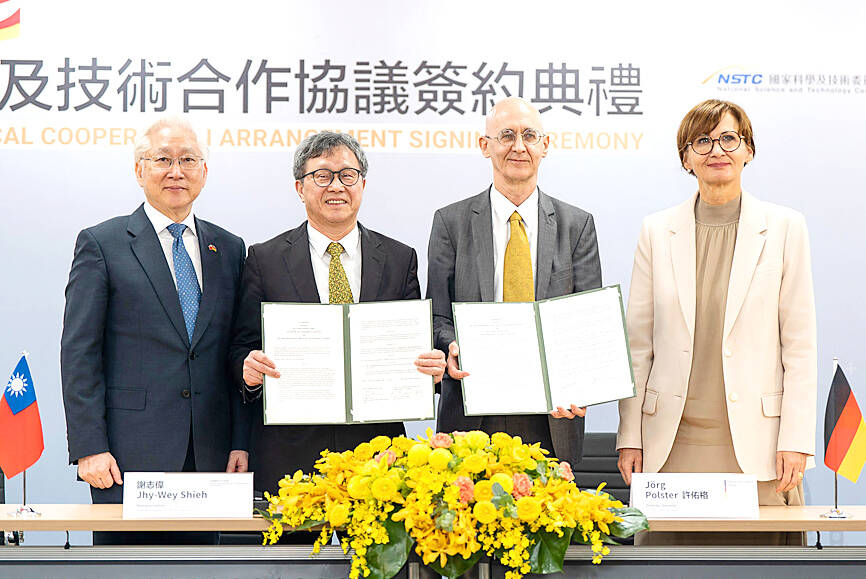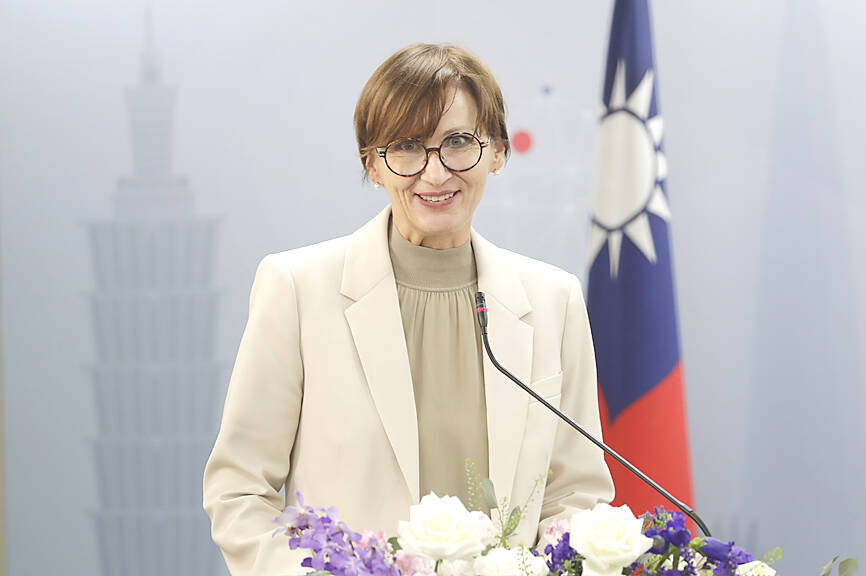Taiwan and Germany yesterday morning inked an agreement on scientific and technological cooperation, with the first German federal Cabinet minister to visit Taiwan in 26 years presiding over the ceremony.
Representative to Germany Shieh Jhy-wey (謝志偉) and German Institute Taipei Director-General Jorg Polster signed the Scientific and Technological Cooperation Agreement (STA) at the National Science and Technology Council in Taipei.
The signing was overseen by German Minister of Education and Research Bettina Stark-Watzinger, who arrived yesterday morning for a two-day visit.

Photo: AFP / National Science and Technology Council
The STA focuses on artificial intelligence, semiconductors, lithium batteries and hydrogen for use in green energy, council Minister Wu Tsung-tsong (吳政忠) said.
It also seeks to cultivate talent, in particular Chinese-language education for German students, he said, adding that it would enable more exchange opportunities for young people.
Wu also hailed the “historic” visit by the German minister, saying that it shows Taiwan is a realiable partner.

Photo: Chiang Ying-ying, AP
When he invited Stark-Watzinger to visit Taiwan during his trip to Germany in November last year, Wu said he never thought she would make it happen within a mere four months.
This shows that Europe — especially Germany — now views Taiwan in a new light, as a free democracy that respects human rights, he said.
Given their strengths in science and technology, Taiwan and Germany complement each other, Wu said.
The STA would set the stage for success, he said, crediting it to the hard work of Taiwan’s 23 million people.
Taiwan is a respected partner in technological research, Stark-Watzinger said, adding that global challenges must be faced together with like-minded countries.
Taiwan and Germany share the values of democracy, transparency, openness and freedom, and have already enjoyed many years of cooperation in various technical fields, she said.
Their complementary technological advantages provide plenty of space for further cooperation, she said.
The new STA would pave the way for more extensive cooperation in economic innovation and high-tech research to the benefit of both sides, she added.
Stark-Watzinger is the first German Cabinet minister to visit Taiwan in 26 years, following a visit by then-German minister of economics Gunter Rexrodt in 1997.
Yesterday afternoon, Stark-Watzinger led her delegation of 14 to visit National Taiwan University.
The delegation is to visit the Siemens training center at Nangang Vocational High School in Taipei this morning, and later meet with Minister of Education Pan Wen-chung (潘文忠) to exchange views on Chinese-language education and semiconductor academies.
In the afternoon, they are to visit the Taiwan Semiconductor Research Institute in Hsinchu before leaving for the airport.

SECURITY: As China is ‘reshaping’ Hong Kong’s population, Taiwan must raise the eligibility threshold for applications from Hong Kongers, Chiu Chui-cheng said When Hong Kong and Macau citizens apply for residency in Taiwan, it would be under a new category that includes a “national security observation period,” Mainland Affairs Council (MAC) Minister Chiu Chui-cheng (邱垂正) said yesterday. President William Lai (賴清德) on March 13 announced 17 strategies to counter China’s aggression toward Taiwan, including incorporating national security considerations into the review process for residency applications from Hong Kong and Macau citizens. The situation in Hong Kong is constantly changing, Chiu said to media yesterday on the sidelines of the Taipei Technology Run hosted by the Taipei Neihu Technology Park Development Association. With

A US Marine Corps regiment equipped with Naval Strike Missiles (NSM) is set to participate in the upcoming Balikatan 25 exercise in the Luzon Strait, marking the system’s first-ever deployment in the Philippines. US and Philippine officials have separately confirmed that the Navy Marine Expeditionary Ship Interdiction System (NMESIS) — the mobile launch platform for the Naval Strike Missile — would take part in the joint exercise. The missiles are being deployed to “a strategic first island chain chokepoint” in the waters between Taiwan proper and the Philippines, US-based Naval News reported. “The Luzon Strait and Bashi Channel represent a critical access

‘FORM OF PROTEST’: The German Institute Taipei said it was ‘shocked’ to see Nazi symbolism used in connection with political aims as it condemned the incident Sung Chien-liang (宋建樑), who led efforts to recall Democratic Progressive Party (DPP) Legislator Lee Kun-cheng (李坤城), was released on bail of NT$80,000 yesterday amid an outcry over a Nazi armband he wore to questioning the night before. Sung arrived at the New Taipei City District Prosecutors’ Office for questioning in a recall petition forgery case on Tuesday night wearing a red armband bearing a swastika, carrying a copy of Adolf Hitler’s Mein Kampf and giving a Nazi salute. Sung left the building at 1:15am without the armband and apparently covering the book with a coat. This is a serious international scandal and Chinese

COUNTERINTELLIGENCE TRAINING: The ministry said 87.5 percent of the apprehended Chinese agents were reported by service members they tried to lure into becoming spies Taiwanese organized crime, illegal money lenders, temples and civic groups are complicit in Beijing’s infiltration of the armed forces, the Ministry of National Defense (MND) said in a report yesterday. Retired service members who had been turned to Beijing’s cause mainly relied on those channels to infiltrate the Taiwanese military, according to the report to be submitted to lawmakers ahead of tomorrow’s hearing on Chinese espionage in the military. Chinese intelligence typically used blackmail, Internet-based communications, bribery or debts to loan sharks to leverage active service personnel to do its bidding, it said. China’s main goals are to collect intelligence, and develop a